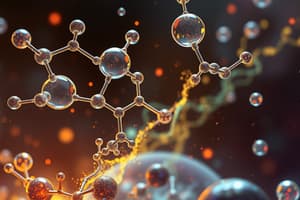Podcast
Questions and Answers
What is an organic compound?
What is an organic compound?
- A compound without carbon
- A member of a large chemical compound that contains carbon (correct)
- A compound that only contains hydrogen
- None of the above
What is Organic Chemistry?
What is Organic Chemistry?
A major branch of chemistry that deals with compounds of carbon.
What is a hydrocarbon?
What is a hydrocarbon?
A compound containing only carbon and hydrogen atoms.
Define refining in the context of chemistry.
Define refining in the context of chemistry.
What is an alkene?
What is an alkene?
What is an alkyne?
What is an alkyne?
What is a cycloalkene?
What is a cycloalkene?
What is cracking?
What is cracking?
What does aliphatic mean?
What does aliphatic mean?
What is an alkane?
What is an alkane?
What is a homologous series?
What is a homologous series?
What is a saturated hydrocarbon?
What is a saturated hydrocarbon?
What is a structural isomer?
What is a structural isomer?
Define an alkyl branch.
Define an alkyl branch.
What is a cycloalkane?
What is a cycloalkane?
What is hydrogenation?
What is hydrogenation?
What does aromatic mean?
What does aromatic mean?
What is a phenyl group?
What is a phenyl group?
Define fractionation.
Define fractionation.
What is a fraction in fractionation?
What is a fraction in fractionation?
What is hydrocracking?
What is hydrocracking?
What is catalytic reforming?
What is catalytic reforming?
Study Notes
Organic Compounds
- Composed of carbon atoms; may exist as gases, liquids, or solids.
Organic Chemistry
- Focuses on carbon-containing compounds, excluding certain oxides and ionic carbon compounds like carbonates and cyanides.
Hydrocarbon
- Defined as compounds solely made of carbon and hydrogen atoms.
Refining
- Involves both physical and chemical methods to separate complex mixtures into simpler, purer components.
Alkene
- Characterized by having one or more carbon-carbon double bonds; follows the formula CnH2n.
Alkyne
- Contains one or more carbon-carbon triple bonds; has a general formula of CnH2n-2.
Cycloalkene
- A cyclic hydrocarbon that includes at least one carbon-carbon double bond, forming a ring structure.
Cracking
- A process to break larger hydrocarbon molecules into smaller ones through high temperatures, optionally using catalysts.
Aliphatic
- Encompasses a diverse group of hydrocarbons, including straight or branched chains and rings of alkanes, alkenes, and alkynes, omitting aromatic compounds.
Alkane
- Composed solely of carbon-carbon single bonds; represented by the general formula CnH2n+2.
Homologous Series
- A series of chemically similar compounds, each differing by a constant unit (e.g., CH2).
Saturated Hydrocarbon
- Contains only carbon-carbon single bonds, providing complete hydrogen atom saturation.
Structural Isomer
- Shares the same molecular formula with another compound but possesses a distinct structural configuration.
Alkyl Branch
- A side chain consisting of carbon and hydrogen that connects to the main molecular structure through single bonds.
Cycloalkane
- A cyclic hydrocarbon where all carbon-carbon bonds are single-bonded; follows the formula CnH2n.
Hydrogenation
- Involves the addition of hydrogen to unsaturated hydrocarbons, reducing the number of multiple bonds.
Aromatic
- Refers to compounds that have a structure similar to that of benzene or benzene-like rings.
Phenyl Group
- Denoted as C6H5, it represents a benzene ring attached as a substituent to a main carbon chain.
Fractionation
- The process of separating components of crude oil based on their boiling point differences.
Fraction
- A specific product obtained through fractionation, characterized by its boiling-point range or the number of carbon atoms in its molecules.
Hydrocracking
- Combines catalytic cracking with hydrogenation to convert heavier feedstocks into lighter products, like gasoline.
Catalytic Reforming
- Converts naphtha fractions into aromatic gasoline molecules through a specialized chemical process.
Studying That Suits You
Use AI to generate personalized quizzes and flashcards to suit your learning preferences.
Description
Test your knowledge of key terms in organic chemistry with these flashcards. Each card features a definition that helps illuminate the principles of organic compounds and reactions. Perfect for students preparing for exams or anyone interested in mastering organic chemistry terminology.




